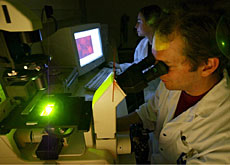Environmentalists dish up GM food for thought

Voters in Switzerland have the final word on Sunday on a proposal to introduce a five-year ban on genetically modified organisms (GMOs) in agriculture.
Environmentalists managed to force a nationwide ballot on the issue by collecting the necessary signatures for a people’s initiative.
The idea for the moratorium dates back several years. At the height of the debate on a law governing GMOs, environmentalists and consumer groups launched their bid in an attempt to put pressure on parliament.
But this political manoeuvre apparently failed because GM crops are allowed by the 2003 legislation under certain conditions, including research.
Supporters of a five-year moratorium argue that GMOs are neither in the interest of consumers nor of Swiss farmers.
“It doesn’t make sense to grow a product nobody wants to buy,” said Hansjörg Walther, president of the Swiss Farmers Association.
Surveys in the past few years have consistently shown that consumers have little interest in GM products.
A report published by the gfs institute in 2003 found two thirds of respondents against GMOs and GM products in agriculture, while only 20 per cent were in favour.
Risks and costs
Campaigners say a GM-free agriculture is an opportunity for farmers to improve their marketing of natural production methods and avoid becoming dependent on the agrochemical industry.
Gene technology has pushed up prices for food in general, because a costly parallel production and distribution structure had to be put in place, according to Simonetta Sommaruga, a senator and president of the Foundation for Consumer Protection.
Its supporters – mainly from the centre-left Social Democratic Party and the Greens – say the moratorium, which does not affect research, would give enough time to consider potential risks of GMOs.
The environmentalists face a formidable battery of opponents, including the government, parliament and three of the four main political parties, but also the business community, researchers and scientists.
Know-how, technology
Economics Minister Joseph Deiss said the current GM law provided enough protection for people and the environment.
“We need to keep up with the latest technologies, otherwise we will be in danger of losing ground to other countries,” Deiss added.
Researchers have been downplaying the potential hazards of biotechnology but warned of a brain drain in Switzerland’s science community if voters accepted the moratorium.
“Ten of Europe’s best 50 biotechnology researchers are Swiss,” said Ernst Hafen president-designate of Zurich’s Federal Institute of Technology.
Swiss agriculture stands to benefit from gene technology, according to Wilhelm Gruissem of the Federal Institute’s Plants Science Centre.
“It could help to reduce the quantity of pesticides used, or provide a solution to the problem of excessive use of fertilizers,” he added.
Bucking the trend
The European Union, of which Switzerland is not a member, lifted a moratorium on GM crops last year. Spain and Romania are the only countries in Europe with sizeable acreages of GM plants, including soy and maize.
The biggest crops are to be found in North and South America, as well as China. GM crops have shown sustained growth rates over the past decade, according to the International Service for the Acquisition of Agri-biotech Applications (ISAAA).
Last year the Federal Institute of Technology in Zurich carried out Switzerland’s only outdoor experiment on GM wheat to date. The trial on the wheat’s resistance against smut fungi came after nearly three years of legal wrangling.
Latest opinion polls, conducted ten weeks before the nationwide vote showed support for the moratorium up one percentage point at 48 per cent.
In a first poll published in October, 47 per cent were for and 36 per cent against.
In 1998 a two-thirds majority of Swiss voters rejected a people’s initiative aimed at an outright ban on GMOs.
swissinfo, Urs Geiser
Under a 2003 law approved by parliament, the use of GM animals is banned, but GM crops and GM research are allowed under certain conditions.
In 1998 Swiss voters overwhelmingly rejected an outright ban on GMOs.
Surveys in Switzerland consistently show that consumers have little interest in GM products.
The EU, of which Switzerland is not a member, lifted its moratorium on GMOs last year.
Environmentalists, farmers and consumer groups launched a people’s initiative aimed at banning GMOs in agriculture for the next five years.
They warn of possible risks of GMOs and point out a lack of demand from consumers. But opponents say the proposal threatens biotechnology research and gives farmers and consumers no real choice.
The Swiss decide on the GMO moratorium on November 27 alongside a proposal to ease labour restrictions for Sunday retail trading.

In compliance with the JTI standards
More: SWI swissinfo.ch certified by the Journalism Trust Initiative











You can find an overview of ongoing debates with our journalists here . Please join us!
If you want to start a conversation about a topic raised in this article or want to report factual errors, email us at english@swissinfo.ch.